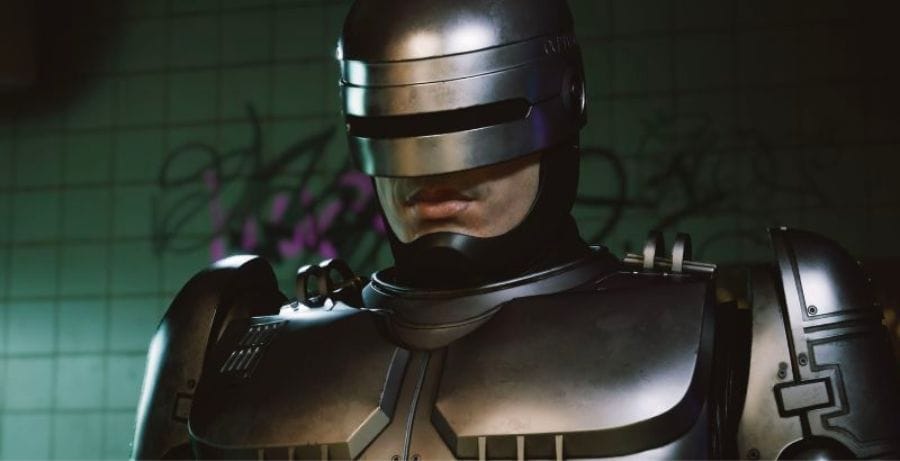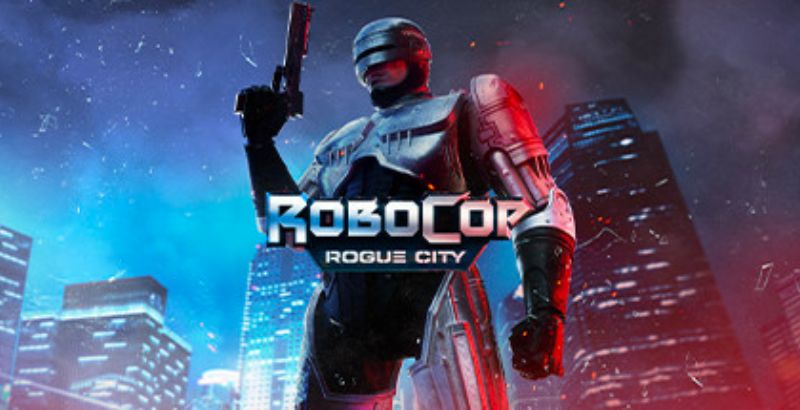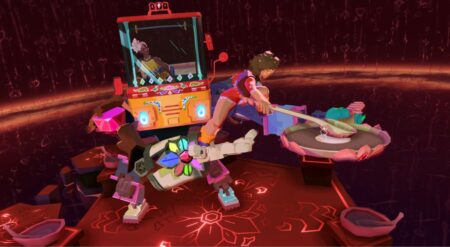If you’ve ever wanted to know what it feels like to be RoboCop, now’s your chance, because developer Teyon and publisher Nacon are on their way with RoboCop: Rogue City, a first-person shooter that puts you right into the android enforcer’s helmet and onto the streets of Detroit to put a stop to a dangerous new gang running drugs around the city.
And I really mean you fall right into RoboCop’s boots. The first thing I was enthralled by the moment the game began was the soundscape. The instant you take your first step, the heavy sound of boots stomping and gears whirring is inescapable. It’s a glorious feeling and an incredible sense of emersion. I’ve seen RoboCop. I enjoy it but it’s not as if it’s in my upper echelon of movies or anything. But this moment of immediate immersion made me question that connection entirely. I don’t know the last time, if ever, that a game made me so instantaneously feel like I was the character.
As you play on, you are made over and over to feel like the character is you, too. One of RoboCop’s main moral quandaries is whether he is more man or machine, and by extension, whether it is more essential to fulfill his function of “upholding the law” or his function of “serving the public trust.” Not to mention “protecting the innocent.” Because while these are the android officer’s prime directives, throughout his history, they have come into stark conflict with one another. Throughout RoboCop: Rogue City, the player is forced to make a lot of decisions as to whether to uphold the letter of the law or to serve the public trust. In fact, these choices, sometimes dialogue and sometimes tactical, over time, affect the interactions you have and the endings you experience in the game.

While the developers of RoboCop: Rogue City confirmed during my playtime that this wasn’t necessarily their explicit intention, what I love the most about this decision-making system is that, because choices aren’t necessarily labeled as responding to one directive or the other, sometimes you’ll end up guessing wrong. There were multiple instances where I assumed that a dialogue option would lend itself to one response but instead, it engendered something completely different.
A man under arrest gave me the option to intimidate him or play it casually, for example, and I thought that playing it casually would de-escalate the situation and allow me to simply move on to find other clues without causing him harm. However, it turned out that doing so actually was the key to getting the truth out of him. This entire system had me thinking deeply about actions, consequences, and perceptions in a way that does the franchise proud. Just because I thought that acting one way as a law enforcement officer would yield one result did not mean that the suspect, civilian, or co-worker I was interacting with would feel similarly. I studied non-profit management in graduate school and spent the beginning of my career working at a soup kitchen. The notion of intention versus consequence is monumental but under-considered in all sectors of public service, from law enforcement to social work, and I’m in awe by how much my brief experience with RoboCop: Rogue City felt like it was a perfect crucible through which to explore this moral and practical dilemma.
Don’t get me wrong, the game is also awesome. The gameplay is similar to the sensation of an on-rails shooter but with modern FPS navigation and some light RPG elements. The game doesn’t have a jump, duck, or dodge mechanic. You can only move forward and back and change the camera to go in a different direction, like any other first-person game. The aiming includes a bit of a targeting system to help you identify your targets like some classic on-rails games would have, and there are plenty of side rooms to explore for ammo, weapons, and evidence which helps you reach a higher score on the level when you complete it. But really, it’s a very straightforward gameplay style.
You start off with the classic RoboCop gun, the Auto 9, which has unlimited ammo and can be upgraded over the course of the game. From there, you can pick up a second weapon from dead enemies and recover their ammo at any point, pick up nearby objects or enemies to hurl at others, and heal yourself when you inevitably take on a barrage of fire in every room you enter. The game offers multiple difficulty settings, and while I only played on normal, I imagine that at higher difficulties it becomes increasingly necessary to move slowly and do your best to hide behind walls to avoid taking on too much damage.

The fact that you can’t jump, duck, or dodge in any way does feel very RoboCop, considering I can’t picture him doing any of those things with his lumbering form. But it does make the gameplay a tad run-and-gun at times. You’re really just soaking up damage everywhere you go and hoping your aim and attention is good enough to spot enemies quickly and efficiently. Which, unto itself is quite fun. Hitting the targets, aiming for their heads or weak spots, and trying to do so as quickly as possible to avoid getting hurt too badly is fun in every room I entered. Especially the breach points where time slows down temporarily to let you really try and take aim, and perhaps save a couple of hostages.
After every level concludes you’ll be scored, gain a certain number of skill points accordingly, and be able to apply them to all kinds of stats that help your combat, health, movement, and so forth. Other skills, for example, aallow you to unlock safes. Between missions, you spend time in various locales where you can complete side missions to gain extra experience and explore the world, but each of these areas is a one-time chance to do so. The game is linear from start to finish. You can replay missions to explore them differently, but once you leave an open area to move onto the next level you cannot return to complete those side missions or pick up the area’s collectables again. This means that if you don’t have the requisite skills to, say, open that safe, there is likely another way to do so you haven’t found, you haven’t been scoring well enough to raise your skills fast enough, or that safe was never really essential to open in the first place.
RoboCop: Rogue City is, so far, a fun and especially immersive FPS. I’ve never been more engrossed in both the gameplay and the morals of a game’s world so quickly and so completely as I was in my few hours exploring this game.
RoboCop: Rogue City is scheduled to arrive on PlayStation, Xbox, and PC September 2023.







